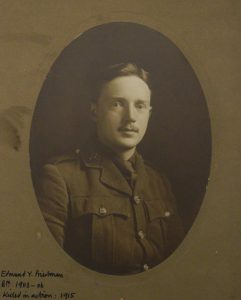
Edmund Yerbury Priestman, Second Lieutenant, 6th York and Lancaster Regiment, fell in action in Gallipoli, November 19th 1915. He was born in Sheffield in 1890 and came to Bootham between 1903 and 1906.
Below is an extract (published in Bootham magazine December 1915 as part of an obituary) from “Night in No Man’s Land” by Edmund Y. Priestman, which gives a picture of his life in the Gallipoli Peninsula
“If No Man’s Land is unpromising by day, when it echoes to the rattle of the rifle, it is possibly oven more sinister when, after nightfall, it becomes a silent and menacing sea of shadows, the haunt of the nightbird, seeking who knows what?—and filled with vague rustlings, now and then dispelled by the sharp roar of a chance shot, which rattles and dies away among the echoes of the hills, to leave the land to sombre silence again.
Out into this eerie tract of lurking horrors it has been the lot of six, under the alleged “leadership” of the writer of these chronicles, to creep for the purpose of laying barbed wire entanglements to hinder the progress of the agile Turk, should he be tempted to pay calls. Lifting each foot carefully like a stalking burglar, the little party advanced with the stealth of Red Indians, making if anything slightly less noise than a herd of camels, and convinced that every step as it crashed and echoed into the night could be heard in every corner of the Peninsula.
A stray shot from the Turkish trench rang out. Private Smith dropped the coil of wire he was carrying with a deafening rattle, and the party stood still and thought of their individual misdeeds, and the new lives they would lead, if by some miracle the Turks omitted to turn all their machine guns on them. Moment succeeded breathless moment, and no devastating blast of fire swept them to sudden doom. The officer, whose duty may be summed up as being to fortify the men by feigning valour he didn’t possess, gulped once, and by some superhuman agency got his rigid muscles into working order again. . . . But when, the wiring party had been collected once more and complete, the explorers returned to the shelter of the friendly parapet, each of them swelled with a manly pride in dangerous work well done, and felt richer in confidence in his own nerves under new stresses. In short, all felt themselves not a little heroic, and it was not until daylight brought with it obvious considerations that the danger was really slight and that the work done was less than that carried through daily and nightly by a thousand of our fellow men, that we came down to earth again, and seeing things in their right proportion, vowed to continue our work next night with less melodrama, and to be quite frank in writing home upon what might have become a very richly coloured topic.”
He is buried at Hill 10 Cemetery, Turkey.
